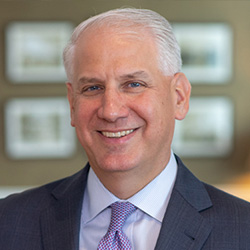Mr. Byrne is currently the President and Chief Executive Officer of The University Financing Foundation (TUFF), a national 501(c)(3) private operating foundation whose mission is to assist institutions of education and research in obtaining facilities and equipment at below market cost. TUFF is a blend of real estate, capital markets, investment banking, and public finance with the primary focus to create facilities for institutions which can use those facilities to expand programming at the institution.
Mr. Byrne is a 1991 Honors graduate from Furman University, where he currently serves on the Board of Trustees. He majored in Accounting and was awarded the Wall Street Journal Student Achievement Award in 1991, the highest honor given by the faculty to a student in the Economics and Business Administration department. He later earned his MBA, with Honors, from the Wharton School of Business.
Mr. Byrne is a Certified Public Accountant and spent his early career in the tax division of Arthur Andersen. He quickly rose at Andersen with primary focus in the real estate and financial services industries. He was appointed to several Andersen specialty teams and developed several of the real estate structuring techniques used by real estate entities today. He was a frequent speaker internally and externally and served all the premier real estate companies and financial institutions in the Southeast.
Prior to TUFF, Kevin founded Byrne & Associates which focused on providing investment banking services to small and middle market companies and served a real estate development firm.
Through the growth of operations at TUFF, Kevin has become nationally recognized in the areas of public- private partnerships, real estate financing structures and the economic development initiatives surrounding university research parks and innovation districts. TUFF has emerged as a leading resource for institutions of education and research relative to the creation of active innovation communities, in addition to real estate development and finance.
He previously served as the President of the Association of University Research Parks (AURP) in both 2012 and 2014. He was appointed by Georgia Lieutenant Governor Casey Cagle to the Georgia Public Private Partnership Guidelines commission. He also serves on two Brookings Institution advisory committees – the Innovation District initiative and the Bass Placemaking initiative.
He is Chairman of the Board of Young Life for Metro Atlanta, an Eagle Scout and member of the Board of Directors of the Atlanta Area Council Boy Scouts of America, member of the Board and Chair of the Whitefield Academy Capital Campaign, and little league baseball and basketball coach for his son.
Abstract
At the forefront of the innovation district concept, Technology Square in Atlanta, GA, USA was conceived over 20 years ago to allow for the convergence of all elements of the innovation ecosystem at the Georgia Institute of Technology (Georgia Tech). Georgia Tech is a leading higher education institution in the world and an economic development driver for the state of Georgia. The manifestation of 1.7 million square feet of space adjacent to the campus in Midtown Atlanta provided fertile ground for the expansion of the Georgia Tech innovation ecosystem.
The development is comprised of academic teaching and research space, office space for small, medium and large companies, all of which interact daily in many of the common spaces within Technology Square. It is also home to a hotel and conference center and street level retail which supports a 24/7 walking atmosphere. Technology Square is the premier innovation ecosystem infrastructure in the city of Atlanta.
Focusing on tomorrow’s infrastructure as the accelerant to the transfer of innovation from research to industry, this session will include details regarding the creation of the idea of Technology Square as well as the predevelopment, development and post occupancy concepts which make this place the center of innovation in Atlanta. Today industry views the physical presence near Georgia Tech as a prerequisite for transfer of innovation because of the nearby talent of faculty, students and entrepreneurs. Companies such as Delta, Home Depot and Coca Cola call Technology Square home and are solving critical business questions with research performed at Technology Square which is immediately transferred to the market. The actual development of the physical infrastructure was a very small part of what makes Technology Square an active epicenter for faculty, students, entrepreneurs and large companies. Details will include the development of a very complex capital stack required for financing and unusual real estate structuring concepts which all for many different users. All together there are four different owners and 16 layers to a capital structure which allows for very efficient occupancy.

